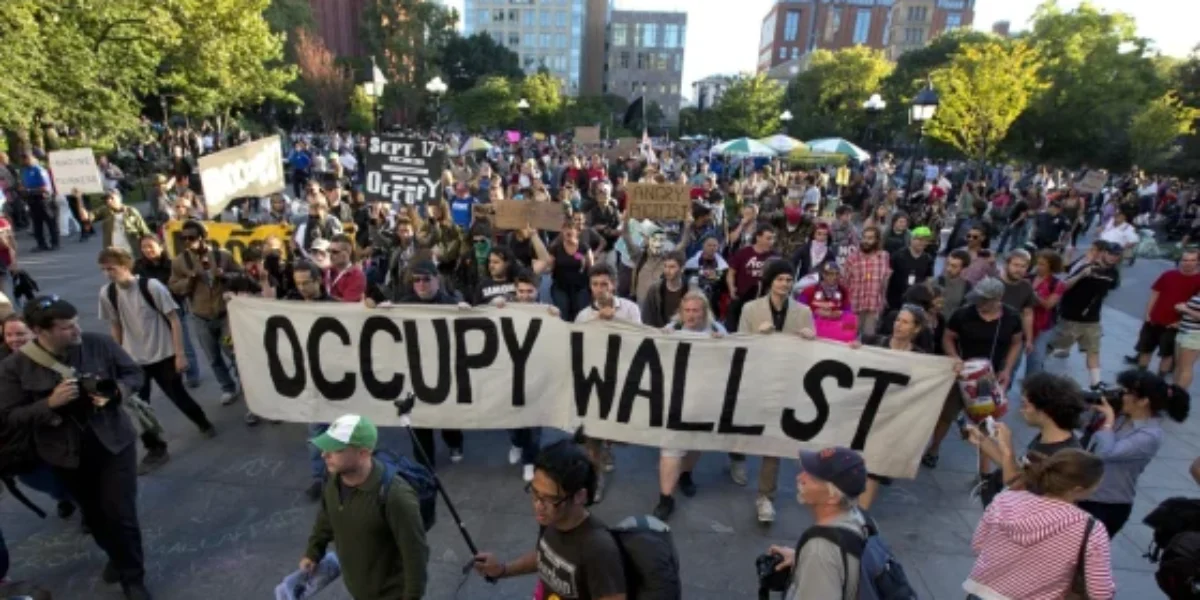Economic Activism and Its Impact
September 17th marks the 13th anniversary of the Occupy Wall Street Movement, a remarkable grassroots movement that gained rapid momentum, drawing attention to the vast wealth gap in the United States and the undue influence of powerful corporations on government policies. Although it faced criticisms and eventual dispersal, the movement left a lasting legacy by reshaping the national discourse on economic justice and inspiring subsequent activism.
Introduction
Occupy Wall Street (OWS) emerged as a response to the 2008 financial crisis, which resulted in widespread economic hardship for millions of Americans. Sparked by a call to action from Adbusters, a Canadian anti-consumerist magazine, protesters began gathering in Zuccotti Park, a privately-owned public space in Lower Manhattan. The movement rapidly gained momentum, attracting individuals from diverse backgrounds, united by their frustration with the perceived inequalities perpetuated by the financial system.
Key Messages of Occupy Wall Street
Income Inequality: One of the central messages of OWS was the glaring wealth gap in the United States. Protesters argued that the top 1% of the population held a disproportionately large share of the country’s wealth, while the remaining 99% struggled to make ends meet. This message resonated with a broad swath of Americans who felt that the economic system was rigged in favor of the wealthy elite.
Corporate Greed: OWS also focused on corporate greed and its influence over government policies. Protesters believed that powerful corporations and financial institutions had an undue influence on the political process, resulting in policies that favored them at the expense of ordinary citizens.
Political Corruption: The movement decried the corrupting influence of money in politics, calling for campaign finance reform and stricter regulations on lobbying. Many occupiers felt that politicians were beholden to wealthy donors rather than serving the interests of the general population.
Student Debt and Education: OWS raised awareness about the growing burden of student debt and the rising cost of education. Many participants carried the weight of substantial student loans and saw their prospects for a secure financial future diminishing.
Impact of Occupy Wall Street
Change in Public Discourse: One of the most significant impacts of OWS was its ability to shift the national conversation. Terms like “the 1%” and “income inequality” became part of everyday political discourse. The movement succeeded in bringing these issues to the forefront of public consciousness.
Inspiring Subsequent Movements: Occupy Wall Street inspired a wave of grassroots activism across the United States and the world. Movements like Occupy Oakland, Occupy Chicago, and Occupy London emerged, all echoing similar concerns about economic inequality and corporate influence.
Policy Reforms: Although OWS did not directly lead to sweeping legislative changes, it did prompt some policy shifts. The movement contributed to the creation of the Consumer Financial Protection Bureau (CFPB) and pushed the issue of financial regulation onto the national agenda.
Presidential Campaigns: The themes and rhetoric of OWS played a role in the 2012 presidential campaign, with candidates from both major parties addressing issues related to income inequality and economic justice.
Criticisms and Challenges
While Occupy Wall Street achieved considerable success in raising awareness about economic inequality, it also faced criticisms and challenges. Some argued that the movement lacked a clear agenda and leadership, which made it difficult to translate its energy into concrete policy changes. Additionally, the eviction of protesters from Zuccotti Park in November 2011 marked a significant setback for the movement.
Legacy of Occupy Wall Street
Evolving Movements: The legacy of OWS can be seen in subsequent movements, such as the Black Lives Matter movement and the Fight for 15 campaign, both of which address various aspects of social and economic inequality. OWS laid the groundwork for these movements by demonstrating the power of grassroots activism.
Continued Advocacy: Many individuals who participated in Occupy Wall Street continued their advocacy work in various forms, such as joining nonprofits, participating in community organizing, or running for political office. This ongoing engagement demonstrates the lasting impact of the movement on those who were part of it.
Conclusion
Occupy Wall Street was a significant moment in recent American history, highlighting issues of income inequality, corporate influence, and political corruption. While it faced criticism and challenges, the movement succeeded in changing the national conversation and inspiring subsequent grassroots activism. Ten years after its inception, the legacy of Occupy Wall Street can be seen in ongoing advocacy efforts and the continued fight for economic justice in the United States. As we reflect on the past decade, it is clear that OWS played a pivotal role in reshaping the nation’s political and social landscape.



